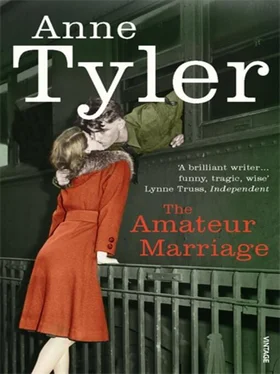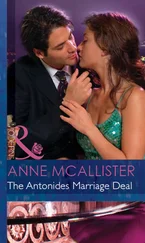In the evenings, often, she and his mother put their heads together over one of her magazines and they would get the giggles. Anything might set them off — an extreme fashion photo or a ludicrous household hint. “‘Saving your silk stockings to donate for the war effort?’” Pauline would quote. “‘Crochet this lovely drawstring sack embroidered in a botanical theme to store them attractively out of sight!’” His mother would double over and make little snuffling sounds, shyly covering her mouth with one hand, her eyes two merry slits. Michael couldn’t remember seeing his mother giggle before, not even when his father and his brother were alive. Only Pauline called up that sense of mirth in her.
He heard the tin alarm clock ticking away on the nightstand — every hollow, slow tick. Other than that, the room was silent. It was a silence that seemed directed toward him personally. “See there?” it asked. “See how little you would have, if you didn’t have Pauline?”
He took his jacket from the closet, and he opened the bedroom door and walked out.
Yes, it was surely going to snow. He could tell by the color of the sky — a pinkish tinge underlying the gray, like the pink in a hand-tinted photograph. There was a flinty smell to the air. The few pedestrians hurried past in a bunched and huddled manner. Each time Michael pegged the sidewalk with his cane a metallic sound rang out, as if the cane’s rubber tip might have frozen solid.
He experienced Pauline’s absence as a torn feeling deep inside him. It would not have been a great shock to discover he was bleeding.
When he was away in boot camp, he used to keep the scarf she’d knitted him folded beneath his pillow. He would pull it forth at night and press it to his face and inhale. At first, it had smelled of Pauline, or he had imagined it had — her almond lotion, her spearmint breath, and even the applesauce scent of her mother’s kitchen. But by the time he shipped out to California, those smells had faded, and the only one left was the yeasty smell of wool. He began to associate the smell of wool with Pauline. It got so any wool — Army blankets, a bunkmate’s watch cap, the mittens some misguided ladies’ club sent to his unit in June — called up in him an ache of almost pleasurable melancholy. He wrote her “I’m making myself sick over you” and “I really don’t think I could live without you”—lines that sounded extreme, he knew, but every word was painfully, absolutely true.
And Pauline wrote back “Miss you!” and “Love you!” and “Wish you could have been here last night when all of us went bowling!” Then her letters grew farther apart and even those few personal remarks, unsatisfying as they were, dwindled to almost nothing. She talked more and more about the canteen where she served coffee and doughnuts to soldiers. She spoke of these soldiers as buddies, “nicest guy from Nebraska” and “the redheaded fellow named Dave, I think I told you about him”; but even so, he couldn’t help worrying when she not only went bowling with them but roller-skating and dancing. “Have to do my patriotic duty!” she said about the dancing. “If jitterbugging’s what it takes, then jitterbug I will!” He read her letters with a narrow squint, struggling to see behind her words. He wrote, “You’re not starting to forget me, I hope,” and she wrote, “I would never forget you! But I can’t just sit at home nights, I’m 21 years old, what do you expect?” In fact, he thought that sitting at home sounded like a fine idea, but he kept that observation to himself.
It didn’t help that he hated the Army. The outdoor life made him miserable, and the lack of privacy drove him to distraction, and nearly all of the time he was afraid. He feared not only combat but the exercises meant to prepare him for it: crawling through scratchy underbrush, twanging between strands of barbed wire, lunging with his bayonet while too close on either side his fellow trainees, grunting hideously, lunged also. In boot camp his secret prayer had been assignment to someplace stateside and safe — to a service battalion, say, in charge of foodstuffs. Wouldn’t that make sense for a grocer’s boy? But he could tell from what they taught him in California (all having to do with explosives) that the Army had other ideas. Special training was just more of the same; in fact he still, ironically, had to bunk beside Private Connor from Virginia with his everlasting cough.
Pauline, meanwhile, was dancing with soldiers and whispering secrets to her girlfriends and fluffing up her hair in front of mirrors. The image of her snug, lacy world filled Michael with longing, though at times it crossed his mind that it was her fault he had enlisted. Well, not her fault, maybe, but her influence — the influence of her admiring and expectant gaze. No, cancel that. A man had to take responsibility for his own decisions.
That was what he’d told himself, and yet daily his resentment against Army life had grown until he lived in a permanent state of barely suppressed rage. He raged against the itch of flying insects on the exercise field, and the increasing weight of his weapon as he stood rigid throughout some officer’s interminable speech, and the infuriating hawk and gargle of Connor’s cough. One night, after Pauline had allowed eight days to go by and then sent only a breezy note describing a visiting captain’s “cultured” Boston accent, Michael leapt from his bed shouting “Stop it! Stop it! Stop it!” and clamped a pillow on Connor’s face and held it down with all his might. It took three men to pull him off. Connor sat up, blinking in a dazed and disbelieving way, and Michael sank back on his cot and buried his head in his hands.
After that, the other men shunned him. He hadn’t made any friends in this new camp anyhow, and now the few who’d been minimally polite began to leave a wide space around him. His superiors observed him too closely, and Connor (a loutish sort) made a point of harassing him every chance he got—”accidentally” upsetting Michael’s coffee mug or jostling him out of formation. Then they took a hike through scrub and Connor’s rifle went off and shattered Michael’s left hip. Nobody even pretended it might have been a mistake. The only mistake, Michael knew, was that he’d been wounded rather than killed. But he was not so naive as to press charges.
And besides, the joke was on Connor, in the end. Michael got to go home.
He crossed Purslane Street and turned left. Now he was in front of the Barclay house, its ground-floor windows outlined by threads of light around the edges of the shades and the wooden porch pillars a luminous white. Michael was not accustomed to porches. He thought of them as luxuries, although the Barclays’ porch had a ramshackle air with its litter of tossed-off galoshes and the rusted snow shovel and stubby straw broom propped expectantly next to the door.
He rang the doorbell. Wiped his feet (unnecessarily) on the coco mat. Started to ring again but changed his mind and raked his fingers through his hair instead.
“Ah,” Mr. Barclay said, finally appearing in a widening shaft of lamplight. “Michael.”
“Hi there, Mr. Barclay.”
“Hi.”
Mr. Barclay stood aside. He wasn’t yet in his bathrobe, at least. He wore a V-necked cardigan and baggy-kneed trousers. A section of the News-Post dangled from one hand, and his rimless reading glasses were sliding down his nose.
“I think it might be going to snow,” Michael said as he stepped inside.
“Yes, that’s what they’re saying, all right.” Mr. Barclay flapped his newspaper in the direction of the stairs. “She’s up there with the baby,” he said. Then he headed back to his armchair.
From her rocker, Pauline’s mother gave Michael a friendly wave. “How’re you doing, Michael?” she asked.
Читать дальше












